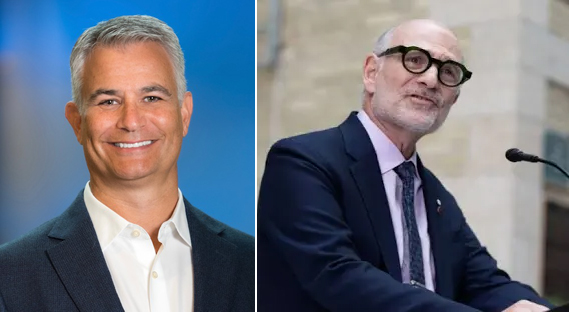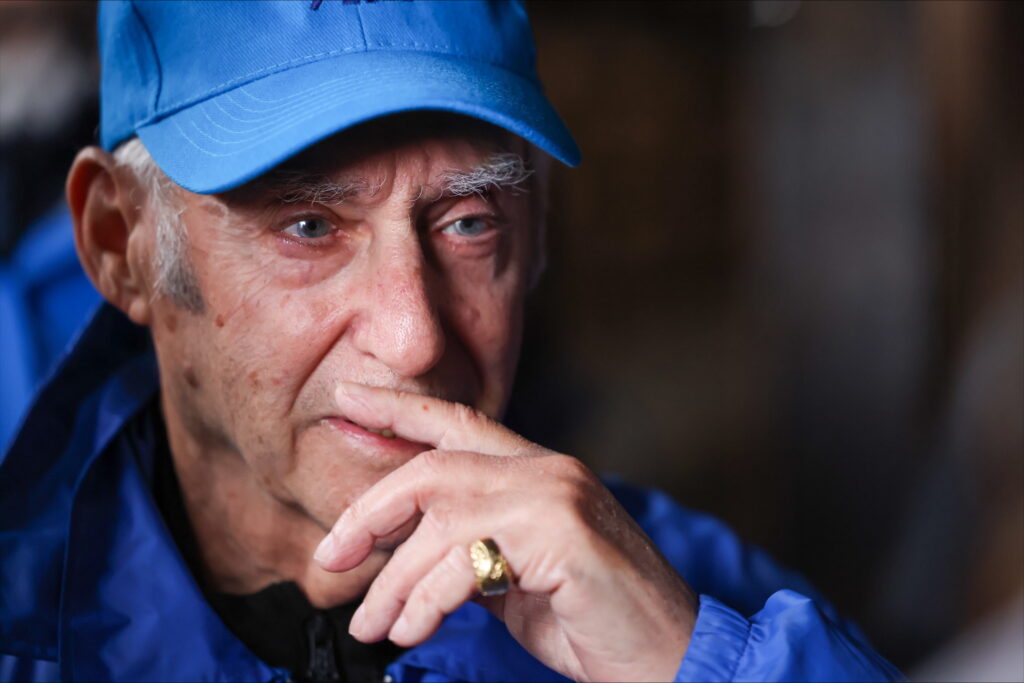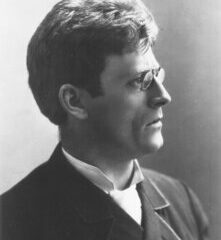Local News
Harvey Chochinov, Steven Kroft recognized with Distinguished Alumni Awards at University of Manitoba Homecoming 2024 celebrations

By MYRON LOVE Every year, as part of Homecoming Week celebrations, the University of Manitoba recognizes a group of alumni who have distinguished themselves in their life’s work. Among the honorees this year were two members of our Jewish community. In a presentation on Thursday, September 19, Dr. Harvey Max Chochinov was recognized with the 2024 Distinguished Alumni Award for Academic Innovation while Steve Kroft was honoured for Lifetime Achievement.
“This is a tremendous honour,” said Kroft, the president of Conviron, a Winnipeg-based company founded by his father that makes controlled environments, providing researchers and entrepreneurs the ability to grow plants indoors. “I feel humbled.
“At the same time, I am somewhat uncomfortable. For everything that I have accomplished, I have had the help of so many other, good people.
“I am grateful, though, for this honour.”
Dr. Chochinov reiterated those same feelings. “I am humbled,” he said. “It is gratifying to be recognized by one’s peers.”
For the long-time psychiatrist, September also brought him a second highlight. A week after receiving the Distinguished Alumni Award, he was in Maastricht in the Netherlands to accept the Arthur M. Sutherland Award bestowed annually by the International Psycho-Oncology Society for lifetime achievement in the field of psycho-oncology. He is the only psychiatrist in Canadian ever to have received the Sutherland award.
The son of Dave and the late Shirley Chochinov, Harvey is a 1983 graduate of the University of Manitoba Faculty of Medicine. After finishing psychiatry residency, he went on to complete his doctoral studies in the Faculty of Community Health Sciences at the University of Manitoba.
It was during his training in psychiatry, he recalled, that he was drawn to the role of psychiatry in palliative care. In furthering his training in that field, he became the first Canadian to complete a Fellowship in Psychiatric Oncology at Memorial Sloan-Kettering Cancer Centre in New York.
Chochinov is now a Distinguished Professor of Psychiatry at the Max Rady School of Medicine, where he has been on faculty for more than 30 years. In addition to his local teaching and research, he has given over 500 invited lectures during the course of his career, in most major academic institutions worldwide.
The first psychiatrist to be awarded a Canada Research Chair in Palliative Care, Chochinov’s focus throughout most of his career has been finding ways to help healthcare professionals preserve patients’ dignity and to acknowledge their personhood. As an example, he cited a situation with his late sister, Ellen. Ellen, he pointed out, was born with cerebral palsy. Five years before she died, he recalled, she was admitted to ICU facing acute respiratory collapse and intubation was being considered.
“The internist came up to me and asked me one question – the only question related to her personhood,” he recounted. “He asked if she read magazines. I understood that question to mean if it was worth inserting a breathing tube. Her internist could see her bent spine, her spastic limbs, her dropping blood gases; but what he couldn’t see was Ellen and the rich, full, complex life she lived. I took a deep breath and replied, ‘Yes, she can read magazines – but only when only when she is between novels.”
The danger for health care professionals is losing sight of the person, he observes. He cited a conversation with a nephrology nurse, who conceded that, after a while, she looked at patients as “kidneys on legs, not as whole persons.” Chochinov said that kind of attitude interferes with being able to empathize with patients or to feel compassion.
“Patients won’t care what you know, until they know that you care,” he continued. “Patient care must be based on whatever ailment they have, along with who they are as whole persons. Healthcare providers who can’t do that become more mechanical or robotic in their approach, and often less satisfied with their job over time, placing them at higher risk for burnout.”
He added that patients look towards healthcare providers for affirmation of themselves. “If they sense a healthcare provider can only see their illness, then patienthood will have eclipsed personhood; and that the essence of who they are as a person has fallen off the clinician’s radar.”
“We must ask patients what they want known about themselves as persons in order to provide the best care possible,” he said. “Without knowing who people are and the nature of their suffering, a commitment to person-centred care is only lip service.”
“In times of sickness and vulnerability, will all want and deserve not only health care, but health caring.”
In the speech when he accepted his Lifetime Achievement Award, 57-year-old Steve Kroft observed that he has always associated “lifetime achievement awards” with the Oscars, “when they wheel out a 96 year-old director, who is well past his prime, to recognize his work, decades after his last movie and just before he appears in the In Memoriam video segment. So, while it is incredibly humbling to be recognized in this way, and so meaningful that it is by my alma mater, I prefer to think of this as a “lifetime so far” achievement award, because I still have lots in the tank, and have lots more to do.”
A lawyer by training, the son of Senator Richard and Hillaine Kroft – following the example of his parents, has written a notable resumé for community service. Among the many organizations that he has been involved with are: the Assiniboine Park Conservancy, the United Way of Winnipeg, the Business Council of Manitoba. CancerCare Manitoba Foundation, the University of Manitoba’s Advisory Council, the Jewish Foundation of Manitoba, the Asper Community Campus board, the Jewish Federation of Winnipeg and the Prairie Theatre Exchange. He is currently National Vice Chair of the Centre for Israel and Jewish Affairs, and a member of the Board of Directors of the True North Youth Foundation, where he also serves as Chair of the Audit and Finance Committee.
Two years ago, he was awarded the Sol Kanee Distinguished Community Service Medal, the highest honour bestowed on a member of Manitoba’s Jewish Community.
In his speech to students, alumni, professors and community leaders on September 19, Kroft courageously tackled the curse of cancel culture at many universities over the past few years.
“One of the things on my list of possibilities since we sold our business two years ago,” he noted, “was to enrol in a university class or two. But I have wondered whether today’s university campus is one on which I could flourish, or even feel completely comfortable. And it’s this issue that I’d like to spend my last few minutes at the podium speaking about this evening.”
He reminisced about his university days when students and faculty would debate all kinds of issues. “Our classes were as diverse then as they are now,” he remembered. “We would take our best crack at making our case, and then listen to others make their arguments, and try to convince them why they were wrong. Quite often we would each move a little in our thinking, but when we didn’t, we would agree to disagree and then we’d go – often together – for a beer. Discourse was civil and respectful. And perhaps most importantly, we felt free to say what we wanted to say without fear of being ostracized – or as one would say today – of being cancelled.
“Somewhere along the way,” he pointed out. “Campuses across North America have come to be made up of not a collection of independent thinking individuals, but rather a collection of groups by which individuals identify themselves and by which they identify others. These groups are often based on race, ethnicity, religion, sexual orientation, but also on things like the perceived haves and have nots. Too often today, positions are presented, or worse yet, assumed, as group positions, and there is little or no interest in discussion or debate. If one is not part of the group, their views are just deemed to be wrong, or out of touch, with little or no exchange of dialogue or ideas. And worse yet, in too many cases, the declaration is not merely that one position is without merit, but that those who hold that different viewpoint are being hurtful or offensive.”
He noted that he has spent a significant part of his life working with others to help people from diverse backgrounds in their quests to make their lives a little better. “I have the utmost respect for those whose instincts are to protect individuals who have traditionally been misrepresented, under-represented or mistreated,” he said.
“But, at the same time, we have to recognize that this “groupification,” and the over-implementation of policies to guard against potential discomfort caused to any group can and is having unintended consequences, and this is especially the case on university campuses. Well-meaning people have become reluctant or outright scared to ask questions, challenge opinions or even use the wrong word, for fear of being cancelled or worse. Being criticized by one individual is one thing, but to be under intense fire from an entire group is quite another.
“We need to restore an environment in which competing ideas can be debated openly and respectfully but, at the same time, I want to be clear that under no circumstances is there a place for hate or intimidation on campus.”
We need to restore an environment in which competing ideas can be debated openly and respectfully, but at the same time I want to be clear that under no circumstances is there a place for hate or intimidation on campus. I am a strong believer in freedom of speech and academic freedom. And it is on university campuses where such speech rightly belongs. However, when people occupy a space without permission or hijack an event to denigrate, threaten or denounce a group because of their race, religion or sexual orientation – whether that be at a university quad or during a valedictory address, university administrators must act and perpetrators must be held to account. The distinction between free speech based on facts, and hateful and intimidating speech based on lies, is not as blurry as some make it out to be. It is incumbent on our administrators and our security services to make those distinctions quickly and decisively. A university campus should be a place where we can challenge ideas and policies without attacking people for who they are.”
In concluding, he asked his audience to take his message as a positive one, “I truly believe,” he stated, “that we are uniquely positioned at the University of Manitoba – because of the diversity within our province -to lead other universities in finding the right balance between open dialogue and respect. We are Winnipeggers and Manitobans after all. Every successful project we have taken on in this city and province, has succeeded because we have tackled it together. Whether it’s a museum, a university capital campaign, a new concert hall on campus; or a new cancer research institute, an addictions centre or a camp for underserved youth, we are always determined to do it better than anyone else has done it, anywhere. Our greatest achievements have come by bringing people of different backgrounds and circumstances together toward a common goal.”
Local News
Further to the Simkin Centre’s financial situation

By BERNIE BELLAN A while back I published an article about the deficit situation at the Simkin Centre. (You can read it at “Simkin Centre deficit situation.“) I was prompted to write that particular article after reading a piece written by Free Press Faith writer John Longhurst in the August 5 issue of the Free Press about the dire situation personal care homes in Winnipeg are in when it comes to trying to provide their residents with decent food.
Yet, Longhurst made one very serious mistake in his article when he wrote that the “provincial government, through the Winnipeg Regional Health Authority, has not increased the amount of funding it provides for care-home residents in Manitoba since 2009.”
In fact, the WRHA has given annual increases to personal care homes, but its allocations are not broken down by categories, such as food or salaries. As a spokesperson for the WRHA explained to me in an email: “PCHs receive per diem global operating funding based on the number of licensed beds they operate. This funding model is designed to support the full range of operating costs associated with resident care, including staffing, food services, utilities, building operations, and other day-to-day expenses.”
Now, one can make a perfectly valid argument that the level of funding from the WRHA has not kept up with inflation, especially inflation in food costs, but the Simkin Centre is in an even more precarious position because of the skyrocketing cost of kosher food.
“In recent years,” according to an article on the internet, “the cost of kosher food has increased significantly, often outpacing general food inflation due to unique supply chain pressures and specialized production requirements.”
Yet, when I asked Laurie Cerqueti how much maintaining a kosher facility has cost the Simkin Centre, as I noted in my previous article about the deficit situation at Simkin, she responded: “approximately $300,000 of our deficit was due to food services. I do not have a specific number as far as how much of the deficit is a result of kosher food…So really this is not a kosher food issue as much is it is an inflation and funding issue.”
One reader, however, after having read my article about the deficit situation at Simkin, had this to say: “In John Longhurst’s article on Aug 5, 2025 in the Free Press, Laurie (Cerqueti) was quoted as saying that the annual kosher meal costs at Simkin were $6070 per resident. At Bethania nursing home in 2023, the non-kosher meal costs in 2023 were quoted as $4056 per resident per year. Even allowing for a 15% increase for inflation over 2 years, the non-kosher food costs there would be $4664.40 or 24% lower than Simkin’s annual current kosher food costs. If Simkin served non-kosher food to 150 of its 200 residents and kosher food to half of its Jewish residents who wish to keep kosher, by my calculation it would save approximately $200,000/year. If all of Simkin’s Jewish residents wished to keep kosher, the annual savings would be slightly less at $141,000.”
But – let’s be honest: Even though many Jewish nursing homes in the US have adopted exactly that model of food service – where kosher food is available to those residents who would want it, otherwise the food served would be nonkosher, it appears that keeping Simkin kosher – even though 45% of its residents aren’t even Jewish – is a “sacred cow” (pun intended.)
So, if Simkin must remain kosher – even though maintaining it as a kosher facility is only adding to its accumulated deficit situation – which currently stands at $779,426 as of March 31, 2025,I wondered whether there were some other ways Simkin could address its deficit while still remaining kosher.
In response to my asking her how Simkin proposes to deal with its deficit situation, Laurie Cerqueti wrote: “There are other homes in worse financial position than us. There are 2 homes I am aware of that are in the process of handing over the keys to the WRHA as they are no longer financially sustainable.”
I wondered though, whether the Simkin Centre Foundation, which is managed by the Jewish Foundation of Manitoba might not be able to help the Simkin Centre reduce its deficit. According to the Jewish Foundation’s 2024 annual report, The Saul and Claribel Simkin Centre Foundation, which is managed by the Jewish Foundation, had a total value of $11,017,635.
The Jewish Foundation did distribute $565,078 to the Simkin Centre in 2024, but even so, I wondered whether it might be able to distribute more.
According to John Diamond, CEO of the Jewish Foundation, however, the bylaws of the Foundation dictate that no more than 5% of the value of a particular fund be distributed in any one year. There is one distinguishing characteristic about the Saul and Claribel Simkin Centre Foundation, in that a portion of their fund is “encroachable.” The encroachable capital is not owned by JFM. It is held in trust by JFM but is beneficially owned by Simkin, similar to a “bank deposit”. While held by the JFM, these funds are included in the calculation of Simkin’s annual distribution.
I asked John Diamond whether any consideration had been given to increasing the distribution that the Jewish Foundation could make to the Simkin Centre above the 5% limit that would normally apply to a particular fund under the Foundation’s management.
Here is what John wrote in response: “The Simkin does have an encroachable fund. That means that at their request, they can encroach on the capital of that fund only (with restrictions). This encroachment is not an increased distribution; rather, it represents a return of capital that also negatively affects the endowment’s future distributions.
”It is strongly recommended that encroachable funds not be used for operating expenses. If you encroach and spend the capital, the organization will receive fewer distribution dollars in the next year and every year as the capital base erodes. Therefore, the intent of encroachable funds is for capital projects, not recurring expenses.”
I asked Laurie Cerqueti whether there might be some consideration given to asking for an “encroachment” into the capital within the Saul and Claribel Simkin Centre Foundation?
She responded: “We are not in a position where we are needing to dip into the encroachable part of our endowment fund. Both of our Boards (the Simkin Centre board and the Saul and Claribel Simkin Centre Foundation board) are aware of our financial situation and we are all working together to move forward in a sustainable way.”
At the same time though, I wondered where donations to the Simkin Centre end up? Do they all end up in the Simkin Centre Foundation, for instance, I asked Laurie Cerqueti on December 15.
Her response back then was: “All donations go through our Foundation.”
I was somewhat surprised to read that answer, so I asked a follow-up question for clarification: “Do all donations made to the Simkin Centre end up in the Simkin Centre Foundation at the Jewish Foundation?”
The response this time was: “No they do not.”
So, I asked: “So, how do you decide which donations end up at the Foundation? Is there a formula?”
Laurie’s response was: “We have a mechanism in place for this and it is an internal matter.”
Finally, I asked how then, the Simkin Centre was financing its accumulated deficit? Was it through a “line of credit with a bank?” I wondered.
To date, I have yet to receive a response to that question. I admit that I am puzzled that a personal care home which has a sizeable foundation supporting it would not want to dip into the capital of that foundation when it is facing a financial predicament. Yes, I can see wanting the value of the foundation to grow – but that’s for the future. I don’t know whether I’d call a $779,425 deficit a crisis; that’s for others to determine, but it seems pretty serious to me.
One area that I didn’t even touch upon in this article, though – and it’s something I’ve written about time and time again, is the quality of the food at the Simkin Centre.
To end this, I’ll refer to a quote Laurie Cerqueti gave to John Longhurst when he wrote his article about the problems personal care homes in Winnipeg are facing: “When it comes to her food budget, ‘we can’t keep making the same number of bricks with less straw.’ “
Local News
Exclusive: Security Enhancement Fund to be announced by Province in coming days

By NOAH STRAUSS The province is set to announce a new program called the Security Enhancement Fund, which will provide funding to religious and faith groups to improve security at institutions such as synagogues and mosques. In an exclusive interview, Minister of Justice Matt Wiebe outlined the plan and detailed what the province has already done to help protect Jewish Manitobans.
“What we want to do is to be able to provide the community with the kind of tools that they need to stay safe and to ensure that everyone in the community feels safe,” said Wiebe.
The fund will provide a missing link between government and religious communities, and
communities will now be able to make their own choices without money being a big restraint.
Essentially, the power will be in the hands of community leaders and not government officials.
The minister noted that the new partnerships will provide the province a better understanding of the needs of every community. Rather than the province making the choices, they are
essentially giving a voice to each community. The grants, totalling $1 million, will provide funds to enhance security at facilities like synagogues.
The Jewish Post reached out to Dr. Rena Secter Elbaze, executive director of Congregation
Shaarey Zedek. “It’s important that the government show us that they’re taking security seriously and stepping up to the plate to make this offer. We will absolutely be applying for grant money,” she said. Elbaze also wants to know whether or not the government will cover the costs of things the synagogue has already spent money on. She noted that the province has, in the past, made grants available to have security guards present.
When speaking about what the Justice Ministry has already done to protect Jewish Manitobans, Wiebe brought up the new special prosecutor that is focusing on hate crimes. Wiebe said thespecial prosecutor works closely with the Winnipeg Police Service “to support investigations and prosecute hate crimes. Wiebe also went on to say how the Department of Education has been helping to fight antisemitism. “The creation of the Holocaust education curriculum is an important step in the right direction,” he said. When asked about Oliver Didtger Ederhof, the individual charged with 14 counts of mischief including vandalism of Shaarey Zedek, Wiebe said decisions like bail and police undertakings are decisions that are in part made by the federal government through the criminal code and policies. “We’re going to continue to advocate for stricter bail reform at the federal level…. I’ve been very clear, we issued clarified directives around bail to our Crown prosecutors.”
The full announcement from the province is expected in the coming days.
Local News
March of the Living 2023 participants form Taste of Hope project to help honour the memory of Holocaust survivor Alex Buckman

By BERNIE BELLAN The March of the Living is an annual two-week international educational program that brings thousands of students and adults to Poland and Israel to study the Holocaust, Jewish history, and the rise of the State of Israel. Founded in 1988, it features a 3-kilometer silent walk from Auschwitz to Birkenau on Yom HaShoah (Holocaust Remembrance Day).
Attendees on the march are accompanied by adults, some of whom themselves have been Holocaust survivors.
Following the week in Poland, participants travel to Israel to observe Yom HaZikaron (Israel’s Memorial Day) and celebrate Yom HaAtzmaut (Israel’s Independence Day), marking a journey from darkness to life.
For many years the coordinator of the march in Winnipeg was Roberta Malam, working on behalf of the Jewish Federation of Winnipeg. More recently Abby Flackman filled that role, and now the person in charge is Lindsey Kerr.
Since its inception 37 years ago the March of the Living has become a rite of passage for many young Winnipeg Jews who have been able to participate as an organized group from Winnipeg and combine visits to the death camp at Auschwitz-Birkenau in Poland with the subsequent trip to Israel.
Then – the Covid pandemic hit – in 2020, and the March of the Living was put on hold for two years – in 2020 and 2021.
In 2022, the March of the Living resumed, but there was no organized contingent from Winnipeg participating. (There may have been some Winnipeggers who did go on the march that year, but if there were any they would have been part of a general Canadian group since there was no Winnipeg coordinator that year.)
In 2023, however, once again a very large contingent of young Canadian Jews – 51 altogether, of whom approximately two-thirds were from Winnipeg, went on that year’s March of the Living. That particular march was memorable for many reasons, including the fact it was the last full march since 2019 and was to remain the last march to have an organized Winnipeg contingent in the past six years as the years 2024 and 2025 were interrupted by the war in Gaza. (There were smaller marches held in 2024 and 2025, but again there was no organized contingent from Winnipeg.)
Recently, we were contacted by one of the participants of that 2023 march, Ethan Levene, who asked us whether we’d be interested in running what turned out be a very poignant story about one particular aspect of that 2023 March of the Living.
Here is what Ethan wrote:
“In April 2023, the Coast to Coast Canadian delegation of March of the Living was privileged to travel with Holocaust survivor Alex Buckman (z”l). March of the Living is a Holocaust education trip that allows participants to visit and bear witness to the sites of the Holocaust. Unfortunately, while sharing his story in Poland, Alex passed away. However, the impact he left on us students was immeasurable.

“While speaking to us in Warsaw, Alex told us the story of his Aunt Becky’s gâteau à l’orange (orange cake). While in Ravensbruck concentration camp, his aunt managed to write down this recipe. After his parents’ murder, his Aunt Becky went on to raise Alex after surviving. In addition to sharing his story, Alex tasked us with baking the cake with family and friends.
“Out of this, a group of alumni from our trip have created this project: ‘A Taste of Hope.’ On February 1st, university students from over 5 universities across Canada will come together to bake the gâteau à l’orange and hear Alex’s story. Proceeds from the event and this fundraising page will support the World Federation of Jewish Holocaust Survivors and Descendants. Alex was heavily involved with this organization, whose mission is to both create community for Holocaust survivors and their descendants and educate about the Holocaust to help fight against antisemitism and all forms of bigotry and hate.
“Here is information from our fundraising page for the event – ‘A Taste of Hope’: Fundraising for A Taste of Hope.
Ethan added that “it’s completely student led, all by alumni from our 2023 trip attending university at these various locations across Canada; Winnipeg, London, Kingston, Montreal.”
He also added: “Follow us on instagram@tastehope.“
Here is a link to a CBC story about Alex Buckman: Alex Buckman story
In a subsequent email Ethan gave the names of Winnipeggers who are involved in A Taste of Hope: Ethan Levene (studies at McGill), Zahra Slutchuk, Alex Stoller (studies at Queens), Coby Samphir, Izzy Silver (studies at Waterloo).
He also added names of others who are involved in the project: Jessie Ages, Anneke Goodwin, Lilah Silver, Ella Pertman, Ellie Vogel, and Talia Cherun.
To find out more about March of the Living in Winnipeg go to: March of the Living






